Suchergebnisse
REal - The laboratory for Integrated Regional Renewable Energy Systems
In the REal project, a holistic, scalable and user-friendly concept was created, whereby sector-coupled, municipal energy systems with 100% renewable energy can be implemented, considering all necessary aspects from planning to operation, reducing design costs and accelerating an Austria-wide implementation.
BIMpeco - Environmentally relevant product data in collaborative BIM environments
Construction products can pose a risk to the environment and health due to their pollutant content or releases. In the BIMpeco project, workflows and data structures for digital information management of this environmentally relevant product data are developed. For this purpose, the new ISO standards ISO 23387 and ISO 19650-1 are tested and synchronized with established process flows. The project results will be made available on an open-source basis and can be integrated into any Common Data Environment (CDE) that complies with the standards mentioned. The BIMpeco project is the first to lay the foundations for product information management of environmentally relevant properties in the CDE, covering the entire lifecycle and supply chain.
SmartControl - Standardisierte und smarte Steuerung von kommunalen Energiesystemen
Das Ziel ist die Entwicklung eines standardisierten und einfach implementierbaren Verfahrens für die Kommunikation, Überwachung und Steuerung von dezentralen Technologien innerhalb von kommunalen Energiegemeinschaften. Dazu werden innovative Schnittstellen und selbstlernende Algorithmen entwickelt, welche sicherstellen, dass das Konzept auf Kommunen bzw. Quartiere - ohne großen Daten- und Messaufwand - übertragen werden kann.
SmartControl - Standardized and smart control of municipal energy systems
The aim of the project is to develop a standardized and easy-to-implement procedure for communication, monitoring and control of decentralized technologies within municipal energy communities. Therefore, innovative interfaces and self-learning algorithms will be developed, which will ensure that the concept can be transferred to municipalities or neighborhoods without a great deal of data and measurement effort.
Standardisierte und smarte Steuerung von kommunalen Energiesystemen (SmartControl)
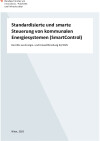
Das Ziel ist die Entwicklung eines standardisierten und einfach implementierbaren Verfahrens für die Kommunikation, Überwachung und Steuerung von dezentralen Technologien innerhalb von kommunalen Energiegemeinschaften. Dazu werden innovative Schnittstellen und selbstlernende Algorithmen entwickelt, welche sicherstellen, dass das Konzept auf Kommunen bzw. Quartiere - ohne großen Daten- und Messaufwand - übertragen werden kann.
Schriftenreihe
82/2025
Stefan Aigenbauer, Pascal Liedtke, Christine Mair, Bernhard Wüster
Herausgeber: BMIMI
Deutsch, 47 Seiten
Downloads zur Publikation
Eisspeicher NEU - Neues wirtschaftliches Eisspeicherkonzept zur optimierten Wärmespeicherung durch Wärmepumpen und Windkraftspitzennutzung
Entwicklung eines technisch und wirtschaftlich optimierten neuen Eisspeicherkonzepts als thermischer Windstromspitzenspeicher und zur Performanceverbesserung von Wärmepumpen als Beitrag zur Spitzenglättung des elektrischen Lastprofils.
Ice-storage NEW - New economical ice storage concept for optimized heat storage using heat pumps and peak use of wind power
Development of a technically and economically optimized new ice-storage concept as a thermal wind power peak storage and to improve the performance of heat pumps as a contribution for peak smoothing of the electrical load profile.
Neues wirtschaftliches Eisspeicherkonzept zur optimierten Wärmespeicherung durch Wärmepumpen und Windkraftspitzennutzung (Eisspeicher NEU)
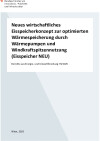
Entwicklung eines technisch und wirtschaftlich optimierten neuen Eisspeicherkonzepts als thermischer Windstromspitzenspeicher und zur Performanceverbesserung von Wärmepumpen als Beitrag zur Spitzenglättung des elektrischen Lastprofils.
Schriftenreihe
79/2025
Ernst Heiduk, Marlene Sayer, Reinhard Haas, Amela Ajanovic, Helmut Schöberl
Herausgeber: BMIMI
Deutsch, 112 Seiten
Downloads zur Publikation
Urban cooling demand in Austria 2030/2050 (UKÖ 2030/2050)
Systematic processing of the increasing cooling demand and presentation of the geographical location of the cooling demand in Austria. The result serves as a decision-making aid for the development of climate protection measures and climate change adaptation strategies as well as an estimate of future cooling demand.
STROMBIZ – Geschäftsmodelle dezentrale Stromerzeugung und Distribution
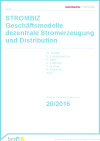
Schriftenreihe
20/2016
W. Amann, N. Komendantova, H. Seitz, A. Kollmann, F. Klocker, H. Prokschy, et al.
Herausgeber: BMVIT
Deutsch, 196 Seiten
Downloads zur Publikation
Missing Link für die Planung CO2-neutraler Gebäude (6D-BIM-Terminal)
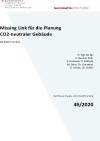
Das Projekt soll die Lücke zwischen FachkonsulentInnen und Building Information Modeling (BIM) Applikationen schließen. Daten, die für die Betrachtung von Kosten, Terminen und Nachhaltigkeitsaspekten notwendig sind, sollen bei BIM-Elementen ergänzt und in die jeweilige Fachplanungs-Software eingelesen werden können. Der Datenaustausch soll unter Verwendung der IFC-Schnittstelle nach ÖN A6241-2 und der Merkmale des ASI-Merkmalservers über eine zentrale Plattform, das „6D BIM-Terminal“, erfolgen.
Schriftenreihe
49/2020
H. Figl, M. Ilg, V. Huemer Kals, A. Krenauer, K. Battisti, M. Dörn, Ch. Doczekal, D. Venus, Ch. Sutter
Herausgeber: BMK
Deutsch, 46 Seiten
Downloads zur Publikation
solSPONGEhigh - Hohe solare Deckungsgrade durch thermisch aktivierte Bauteile im urbanen Umfeld
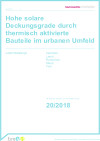
Im Forschungsprojekt solSPONGEhigh wurde die intensive Nutzung von thermisch aktivierten Bauteilen (TABs) als zusätzlicher thermischer Speicher in verschiedenen Gebäuden unter vorrangigem Einsatz von Solartechnologien untersucht. Die Arbeitshypothese ging davon aus, dass durch die Aktivierung und Nutzung der bauteilimmanenten thermischen Speicher eine Deckung des Gebäudeenergiebedarfs mit Solartechnologien von bis zu 100 % erreicht werden könnte.
Schriftenreihe
20/2018
Heimrath, Lerch, Ramschak, Mach, Fink
Herausgeber: BMVIT
Deutsch, 112 Seiten
Downloads zur Publikation
Ökonomisch optimiertes Regelungs- und Betriebsverhalten komplexer Energieverbünde zukünftiger Stadtquartiere (ÖKO-OPT-QUART)
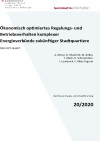
Im Projekt ÖKO-OPT-QUART wurden energietechnische, ökonomische und regelungstechnische Modelle zur Simulation der Betriebsführung komplexer, nachhaltiger Energieverbünde für Stadtquartiere entwickelt. Diese Modelle werden danach für eine Beispielkonfiguration zu einem umfassenden Gesamtmodell kombiniert und erlauben einen realistischen ökonomischen Vergleich verschiedener Regelungsstrategien. Das übergeordnete Ziel des Projekts ist die Entwicklung einer Methode zur systematischen Erstellung kostenoptimierender, vorausschauender Regelungsstrategien für komplexe Energieverbünde in Stadtquartieren.
Schriftenreihe
20/2020
A. Moser, D. Muschick, M. Gölles, T. Mach, H. Schranzhofer, I. Leusbrock, C. Ribas Tugores
Herausgeber: BMK
Deutsch, 67 Seiten
Downloads zur Publikation
Effiziente Lösungen für Photovoltaik-Energiemanagement basierend auf Blockchain-Technologie (SonnWende+)
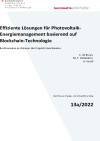
Das Projekt analysiert Blockchain-Technologie im Kontext erneuerbarer elektrischer Einspeisung und Flexibilität im Innovationslabor "Energie Innovation Cluster Südburgenland". Ziel ist die Erforschung neuer und effizienter Lösungen für Energiemanagement-Services und Energiehandel.
Schriftenreihe
13/2022
M. Stefan, R. Hemm, R. Graf, P. Zehetbauer, T. Tötzer, R. Schmidt, M. Niederkofler, T. Zeinzinger, M. Holzleitner, A. Veseli
Herausgeber: BMK
Deutsch, 75 Seiten
Downloads zur Publikation
Optimiertes Regelungs- und Betriebsverhalten thermisch aktivierter Gebäude zukünftiger Stadtquartiere (ÖKO-OPT-AKTIV)
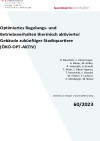
Entwicklung und Simulation skalierbarer, verteilter Regelstrategien zur Nutzung der Speicherwirkung thermisch aktivierter Bauteile in Gebäuden zukünftiger Stadtquartiere bei deren Energieversorgung durch eine Energiezentrale.
Schriftenreihe
60/2023
D. Muschick, V. Kaisermayer, A. Moser, M. Gölles, R. Heimrath, D. Brandl, T. Mach, C. Ribas-Tugores, T. Ramschak, S. Oswald, M. Polster, F. Lackner, K. Eibisberger, M. Nebel
Herausgeber: BMK
Deutsch, 76 Seiten
Downloads zur Publikation
Systemübergreifende optimale dezentrale Hybridspeicher-4-Industrie und Gewerbe (Symbiose-4-IuG)
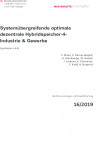
Im Projekt Symbiose-4-IuG wurde die Kopplung bestehender Energienetze/-träger an zentraler Stelle im Energienetz oder dezentral direkt beim Kunden (Haushalte, Industrie und Gewerbe) und der Einsatz von dezentralen Speichertechnologien untersucht. Anhand von Modellnetzen werden optimale Positionen, Technologien und Dimensionen der Speicher- und Umwandlungstechnologien im Energiesystem ermittelt und der optimierte energienetzübergreifende Betrieb größerer Kundengruppen im Hybridnetz mit Eigenerzeugung berechnet.
Schriftenreihe
16/2019
C. Maier, S. Nemec-Begluk, H. Heimberger, W. Gawlik, I. Leobner, K. Ponweiser, F. Koidl, H. Buzanich
Herausgeber: BMVIT
Deutsch, 174 Seiten
Downloads zur Publikation
VisErgyControl - Integrale Tages- und Kunstlichtsteuerung für hohen visuellen und melanopischen Komfort bei hoher Primärenergieeffizienz
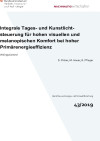
In VisErgyControl wurde eine integrale simulationsgestützte Tages- und Kunstlichtsteuerung entwickelt. Diese geht insbesondere auf die visuellen und melanopischen Bedürfnisse der NutzerInnen (biologische Wirksamkeit von Tages- u.- Kunstlicht) ein und soll gleichzeitig den Heiz- und Kühlbedarf des Gebäudes minimieren.
Schriftenreihe
43/2019
D. Plörer, M. Hauer, R. Pfluger
Herausgeber: BMVIT
Deutsch, 63 Seiten
Downloads zur Publikation
Optimierung der Gebäudeenergieeffizienz durch modellbasierte Energiestromanalyse mit non-invasiver Sensorik
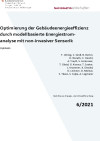
OptiMAS untersuchte, wie durch eine modellbasierte Energiestromanalyse und unter Verwendung von Anlegesensorik bestehende Gebäude überwacht, analysiert und optimiert werden können, unabhängig von den darin verwendeten HLK-Systemen und deren Automationskomponenten.
Schriftenreihe
6/2021
F. Wenig, C. Seidl, B. Derler, D. Rixrath, C. Heschl, A. Treytl, S. Cerimovic, T. Glatzl, G. Kovacs, T. Sauter, L. Krammer, K. Diwold, D. Lechner, D. Molnar, S. Tkauz, S. Cejka, A. Lugmaier
Herausgeber: BMK
Deutsch, 77 Seiten
Downloads zur Publikation
GameOpSys - Gamification für die Optimierung des Energieverbrauchs von Gebäuden und übergeordneten Systemen
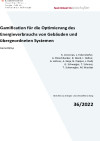
Zentrales Ziel ist die Entwicklung einer mobilen Anwendung, welche durch Partizipation des Nutzers und der Nutzerin als neue Daten- und Informationsquelle die Energieoptimierung und Planung von Gebäuden, Quartieren und übergeordneten Energiesystemen ermöglicht. Die Entwicklung der Anwendung erfolgt stark transdisziplinär und integriert dabei mathematische Methoden der Simulation und Optimierung sowie psychologische Aspekte des Nutzerverhaltens um neue Geschäftsmodelle zu erarbeiten und neue Märkte zu erschließen.
Schriftenreihe
36/2022
K. Corcoran, L. Eckerstorfer, A. Fleischhacker, B. Glock, I. Hafner, G. Lettner, A. Noja, N. Popper, J. Radl, G. Schweiger, T. Schranz, T. Schwengler, M. Wastian
Herausgeber: BMK
Deutsch, 50 Seiten
Downloads zur Publikation
Digital Urban Mining Platform: Assessing the material composition of building stocks through coupling of BIM to GIS (BIMstocks)
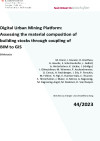
Hauptziel von BIMstocks ist die Entwicklung einer Methodik für die digitale Erfassung der materiellen Zusammensetzung des Baubestandes für die Modellierung einer digitalen Urban Mining Plattform sowie Prädiktion der Recyclingpotentiale.
Schriftenreihe
44/2023
M. Honic, I. Kovacic, D. Breitfuss, G. Gourlis, S. Schützenhofer, J. Gallistl, A. Hinterleitner, K. Löcker, I. Schlögel, I. Gilmutdinov, M. Wimmer, P. Aschenbrenner, O. Cencic, H. Rechberger, I. Erb, P. Ferschin, M. Fellner, H. Figl, V. Huemer-Kals, C. Thurner, S. Hinterholzer, J. Maier, U. Moroz, A. Ragossnig, M. Ragossnig-Angst, M. Raskovic, D. Van Rooyen
Herausgeber: BMK
Deutsch, 57 Seiten
